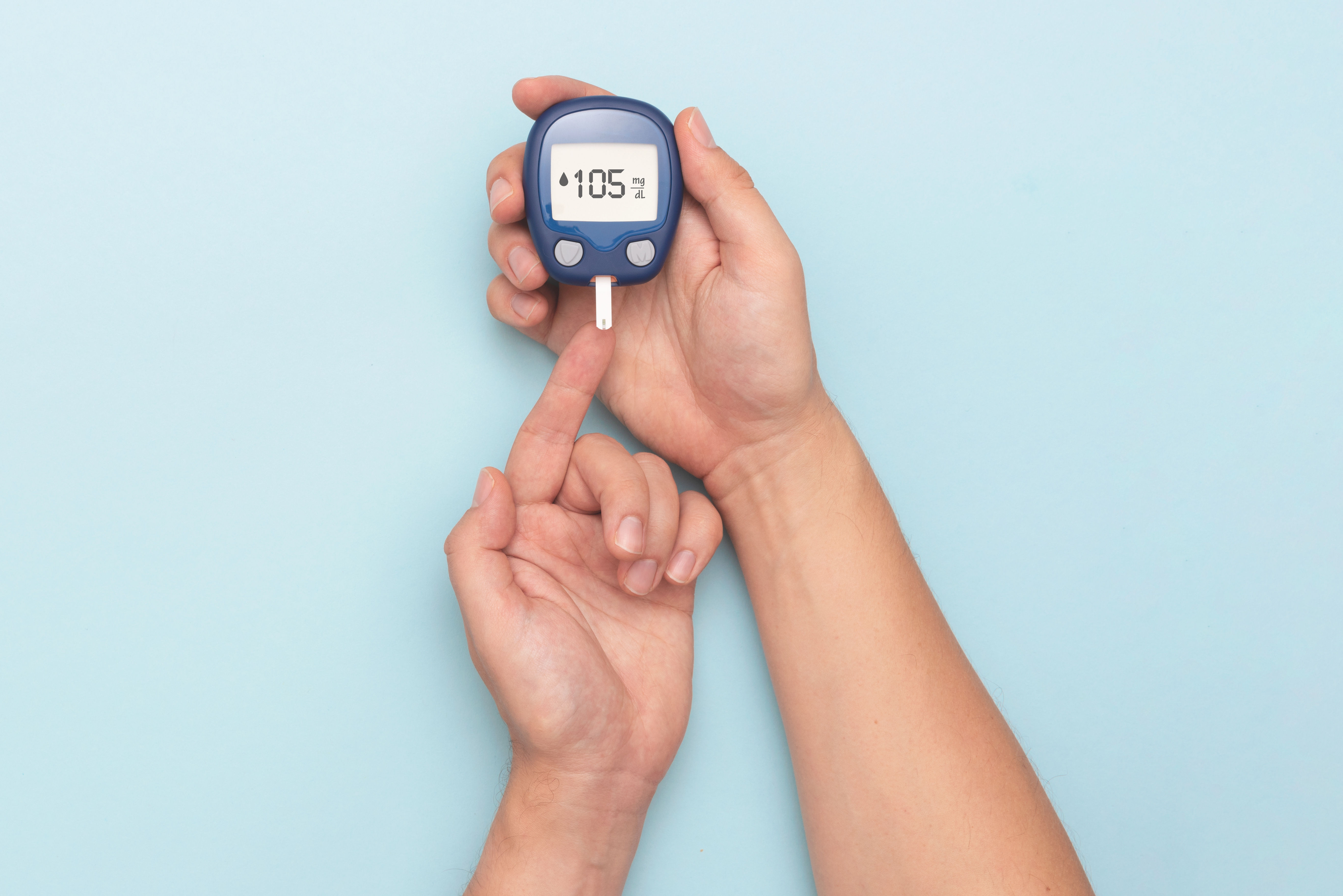Is Carrot Good For Diabetes? Understanding Its Health Benefits
Discover why carrots can be a healthy choice for diabetes. Learn about their benefits, nutritional value, and impact on blood sugar levels.

Written by Dr Sonia Bhatt
Last updated on 3rd Jul, 2025
Carrots are a popular and nutritious vegetable, often praised for their vibrant colour and sweet flavour. Still, if you have diabetes, you may be wondering whether this vegetable can fit into your diet. The answer is yes—carrots can be an excellent food choice for managing diabetes. Thanks to their low glycemic index (GI), high fibre content, and wealth of essential nutrients, carrots support blood sugar control and overall well-being.
In this article, we’ll explore the nutritional profile of carrots, their impact on blood sugar levels, the potential health benefits for people with diabetes, and how to include them in your diet.
Nutritional Profile of Carrots
Carrots are a nutrient-rich, low-calorie vegetable that can easily be incorporated into a diabetes-friendly meal plan. Here's an overview of their key nutritional components:
Low Glycemic Index (GI): Carrots have a GI of 16 when raw, which is classified as very low. This means they cause only a slow and steady rise in blood sugar levels, making them an ideal food for diabetes management.
High in Fiber: One medium-sized raw carrot contains approximately 2.3 grams of fibre. Fiber helps regulate blood sugar by slowing the absorption of glucose into the bloodstream. It also promotes satiety, helping with weight management—a key factor in diabetes control.
Packed with Nutrients: Carrots are an excellent source of beta-carotene, which the body converts into vitamin A. Vitamin A plays a crucial role in eye health, immune function, and skin health. Carrots also provide vitamin C, vitamin K, potassium, and antioxidants, which all contribute to general well-being and may help reduce inflammation, a common issue in diabetes.
Glycemic Index and Its Relevance to Diabetes
The glycemic index (GI) is a vital tool for individuals managing diabetes, as it helps them understand how different foods affect their blood sugar levels. The GI measures how quickly a carbohydrate-containing food raises blood sugar levels compared to pure glucose, which has a GI of 100. Foods are categorised into three groups based on their GI values:
High GI: 70 or above
Medium GI: 56 to 69
Low GI: 55 or below
For diabetics, consuming low-GI foods can help maintain stable blood sugar levels by causing slower, more gradual increases in blood sugar. Since carrots have a GI of 16, they fall into the low-GI category, making them an excellent choice for steady blood sugar levels and reducing the risk of rapid spikes after meals.
How Carrots Affect Blood Sugar Levels
Foods with a low GI release glucose slowly and gradually, helping to avoid sharp spikes in blood sugar. Here's how carrots impact blood sugar:
Raw Carrots (GI: 16): Due to their low GI, raw carrots are an excellent choice for maintaining stable blood sugar levels. The fibre in raw carrots slows down digestion and glucose absorption, providing a steady release of energy without causing rapid increases in blood sugar.
Cooked Carrots (GI: 32-49): Cooking carrots increases their GI slightly, though they still remain in the low to moderate range based on the cooking method. While cooked carrots may cause a slightly faster rise in blood sugar compared to raw carrots, their overall impact remains manageable due to their fibre content.
Health Benefits of Carrots for People with Diabetes
Carrots offer several health benefits, especially for people managing diabetes. Here are some key reasons why they can be a valuable part of your diet:
Helps Control Blood Sugar Levels: The low GI and high fibre content of carrots help stabilise blood sugar levels. Consuming low-GI foods regularly can prevent post-meal blood sugar spikes, particularly important for people with diabetes.
Supports Weight Management: For those with type 2 diabetes, maintaining a healthy weight is essential for managing the condition. Carrots are low in calories yet high in fibre, making them an excellent option for promoting satiety and preventing overeating.
Antioxidant and Anti-Inflammatory Properties: Carrots are rich in beta-carotene and vitamin C, both of which are powerful antioxidants. These antioxidants help fight oxidative stress, a contributing factor to complications like heart disease, kidney issues, and nerve damage in diabetes. By reducing inflammation and protecting against cellular damage, carrots support long-term health.
Supports Eye Health: Diabetic individuals are at increased risk of developing diabetic retinopathy and other eye-related issues. Vitamin A, derived from beta-carotene, plays an important role in maintaining eye health and preventing vision problems, making carrots a particularly beneficial food for those with diabetes.
Promotes Digestive Health: The fibre in carrots also supports healthy digestion, reduces the risk of constipation, and promotes regular bowel movements. Proper digestion aids in the absorption of nutrients and helps maintain steady blood sugar levels.
Can Diabetics Eat Raw Carrots?
Absolutely! Raw carrots are an excellent choice for people with diabetes. Their low glycemic index (GI), high fibre content, and satisfying crunch make them a perfect snack or addition to meals. Eating raw carrots helps preserve their fibre, which supports blood sugar regulation.
However, it's important to remember that portion control is key. While carrots are low in carbohydrates, consuming them in moderation is crucial to managing your overall carbohydrate intake and maintaining balanced blood sugar levels.
Is Carrot Juice Safe for Diabetics?
Carrot juice is a popular and nutritious drink, but there are some considerations for people with diabetes. While it provides the same vitamins and minerals as whole carrots, juicing removes most of the fibre, which can result in a quicker rise in blood sugar levels. Without the fibre to slow absorption, carrot juice may lead to more rapid glucose spikes.
If you enjoy carrot juice, it's best to consume it in moderation and without added sugars. Pairing carrot juice with a source of protein or healthy fat, like a handful of nuts, can help slow the absorption of sugar and mitigate blood sugar spikes.
How to Include Carrots in a Diabetes-Friendly Diet
There are many delicious ways to enjoy carrots as part of a diabetes-friendly diet. Here are some ideas for incorporating them into your meals:
Raw Snacks: Slice raw carrots into sticks or rounds and enjoy them with a healthy dip, such as hummus or guacamole.
Carrot Salads: Add shredded raw carrots to salads for extra crunch and nutrition.
Soups and Stews: Add carrots to enhance the flavour and nutrition of vegetable soups, stews, or broths.
Roasted Carrots: Toss carrots with olive oil, herbs, and spices, then roast them for a savoury and flavorful side dish.
Stir-Fries: Slice carrots and add them to vegetable stir-fries along with other non-starchy vegetables like bell peppers and zucchini.
Conclusion
Carrots are a highly nutritious and diabetes-friendly food choice. Their low glycemic index, high fibre content, and rich array of essential nutrients make them a beneficial addition to a diabetes-friendly diet. Regular consumption of carrots can aid in blood sugar control, weight management, and overall health. Whether enjoyed raw, roasted, or cooked, carrots provide numerous health benefits without causing spikes in blood sugar levels.
However, it’s important to consume them in moderation and as part of a well-rounded meal plan. If you have specific questions about incorporating carrots into your diabetes management plan, consulting with a healthcare provider or dietitian is recommended for personalised advice.
Consult Top Endocrinologists
Consult Top Endocrinologists

Dr Venkata Naga Sai Tribhushan Rambhatla
General Physician
3 Years • MBBS
Bengaluru
PRESTIGE SHANTHINIKETAN - SOCIETY CLINIC, Bengaluru

Dr. Anand Ravi
General Physician
2 Years • MBBS
Bengaluru
PRESTIGE SHANTHINIKETAN - SOCIETY CLINIC, Bengaluru

Dr. Nithin Reddy Modhugu
Endocrinologist
6 Years • MBBS, MD (General Medicine), DNB (Endocrinology)
Hyderabad
Dr. Nithin's Endocrine Clinic, Hyderabad
(100+ Patients)

Dr. Gayatri S
Endocrinologist
4 Years • Suggested Qualifictaion- MBBS, MD (Internal Medicine), DM (ENDOCRINOLOGY)
Nellore
Narayana hospital, Nellore

Dr. Shrikrishna V Acharya
Endocrinologist
25 Years • MBBS, MD, DM(Endocrinology), MRCP (Endocrinology)
Bengaluru
Apollo Clinic, JP nagar, Bengaluru



